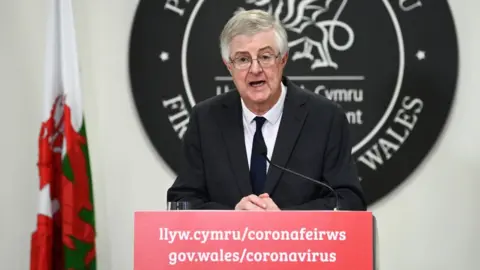Covid: Welsh First Minister Mark Drakeford says wife and mother both had the virus
First Minister Mark Drakeford has spoken of "difficult days" after his wife and mother fell ill with coronavirus earlier in the year.
Mr Drakeford moved out of his home into a building in his garden to keep his family safe during the pandemic.
Speaking to the BBC, the first minister said his most difficult personal moment was when his wife Clare, and his mother, contracted the virus.
He has previously said they have recovered from the virus.
Mr Drakeford, who became first minister in December 2018, is placing Wales under a 17-day national lockdown from 18:00 BST on Friday after a rise in cases.
According to Public Health Wales, 1,722 people in Wales are known to have died with Covid and 37,400 people have now tested positive.
Speaking to Laura Kuenssberg on BBC Newscast, Mr Drakeford said his hardest personal moment during the pandemic was when his close family members became ill.
"On a purely personal level both my wife and my mother fell ill with coronavirus at a point where I was not able to live at home because they were both vulnerable," he said.
"There were some difficult days where they were both quite unwell."

Mr Drakeford, 66, also said his hardest moment as first minister was when they were considering what to do if the Welsh NHS reached full capacity.
"Back in April I spent a weekend... in conversations with people about what we would do if we ran out of critical care capacity, if we didn't have the ventilators we needed and if our medical staff on the front line were having to make invidious choices between who they could treat and who they couldn't treat," he said.
"Nobody comes into the sort of jobs that we do expecting to have to face those sorts of decisions."
 Getty Images
Getty ImagesMr Drakeford said things never got to that stage, but medical experts were having to sit down and face what would happen if the NHS was overwhelmed.
"When you sit and face the reality of that, and the fact that might happen here in Wales then that was a very deeply sobering moment," he said.
"Thank goodness in the end we were able to avert that."
